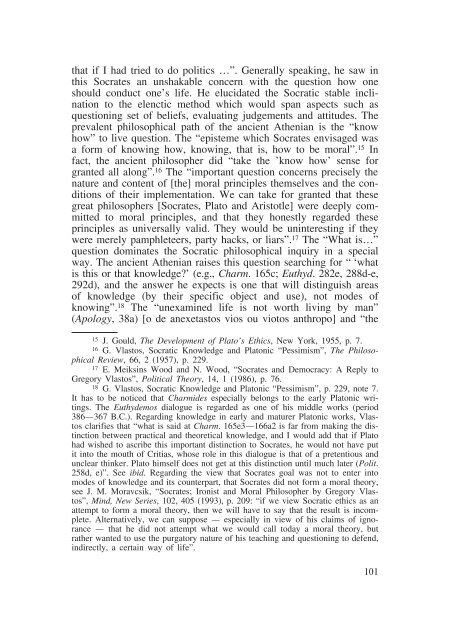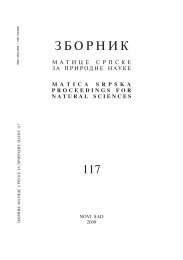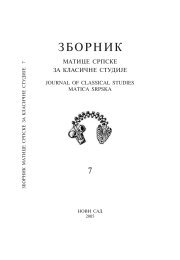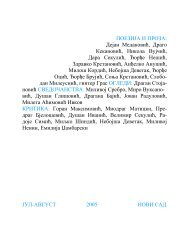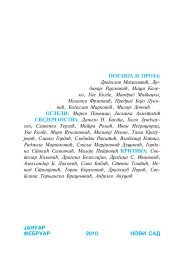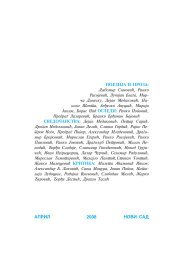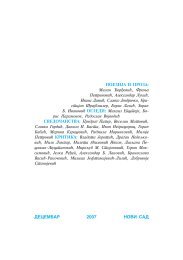You also want an ePaper? Increase the reach of your titles
YUMPU automatically turns print PDFs into web optimized ePapers that Google loves.
that if I had tried to do politics …". Generally speaking, he saw in<br />
this Socrates an unshakable concern with the question how one<br />
should conduct one's life. He elucidated the Socratic stable inclination<br />
to the elenctic method which would span aspects such as<br />
questioning set of beliefs, evaluating judgements and attitudes. The<br />
prevalent philosophical path of the ancient Athenian is the “know<br />
how" to live question. The “episteme which Socrates envisaged was<br />
a form of knowing how, knowing, that is, how to be moral". 15 In<br />
fact, the ancient philosopher did “take the 'know how' sense for<br />
granted all along". 16 The “important question concerns precisely the<br />
nature and content of [the] moral principles themselves and the conditions<br />
of their implementation. We can take for granted that these<br />
great philosophers [Socrates, Plato and Aristotle] were deeply committed<br />
to moral principles, and that they honestly regarded these<br />
principles as universally valid. They would be uninteresting if they<br />
were merely pamphleteers, party hacks, or liars". 17 The “What is…"<br />
question dominates the Socratic philosophical inquiry in a special<br />
way. The ancient Athenian raises this question searching for “ ‘what<br />
is this or that knowledge?' (e.g., Charm. 165c; Euthyd. 282e, 288d-e,<br />
292d), and the answer he expects is one that will distinguish areas<br />
of knowledge (by their specific object and use), not modes of<br />
knowing". 18 The “unexamined life is not worth living by man"<br />
(Apology, 38a) [o de anexetastos vios ou viotos anthropo] and “the<br />
15 J. Gould, The Development of Plato's Ethics, New York, 1955, p. 7.<br />
16 G. Vlastos, Socratic Knowledge and Platonic “Pessimism", The Philosophical<br />
Review, 66, 2 (1957), p. 229.<br />
17 E. Meiksins Wood and N. Wood, “Socrates and Democracy: A Reply to<br />
Gregory Vlastos", Political Theory, 14, 1 (1986), p. 76.<br />
18 G. Vlastos, Socratic Knowledge and Platonic “Pessimism", p. 229, note 7.<br />
It has to be noticed that Charmides especially belongs to the early Platonic writings.<br />
The Euthydemos dialogue is regarded as one of his middle works (period<br />
386—367 B.C.). Regarding knowledge in early and maturer Platonic works, Vlastos<br />
clarifies that “what is said at Charm. 165e3—166a2 is far from making the distinction<br />
between practical and theoretical knowledge, and I would add that if Plato<br />
had wished to ascribe this important distinction to Socrates, he would not have put<br />
it into the mouth of Critias, whose role in this dialogue is that of a pretentious and<br />
unclear thinker. Plato himself does not get at this distinction until much later (Polit.<br />
258d, e)". See ibid. Regarding the view that Socrates goal was not to enter into<br />
modes of knowledge and its counterpart, that Socrates did not form a moral theory,<br />
see J. M. Moravcsik, “Socrates; Ironist and Moral Philosopher by Gregory Vlastos",<br />
Mind, New Series, 102, 405 (1993), p. 209: “if we view Socratic ethics as an<br />
attempt to form a moral theory, then we will have to say that the result is incomplete.<br />
Alternatively, we can suppose — especially in view of his claims of ignorance<br />
— that he did not attempt what we would call today a moral theory, but<br />
rather wanted to use the purgatory nature of his teaching and questioning to defend,<br />
indirectly, a certain way of life".<br />
101


